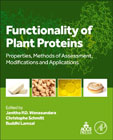
Functionality of Plant Proteins: Properties, Methods of Assessment, Modifications and Applications
Wanasundara, Janitha P.D.
Schmitt, Christophe
Lamsal, Buddhi
Functionality of Food Proteins: Mechanisms, Modifications, Methods of Assessment and Applications provides researchers and users of plant-based proteins with the latest developments on their functionality at the molecular and ingredient level, and in food applications. The book discusses the biological, chemical and physical principles behind the techno-functional and nutritional properties of proteins, existing methods of functionality assessment, and protein modification for functional enhancement. With market demand for protein ingredients, several lesser known sources are being utilized to develop new protein ingredients and products, with some intended to replace, partially or wholly, traditional proteins such as egg, milk, meat, soy and vital gluten.Depending on the source and processing into ingredients, the ability of these proteins to satisfy techno-functional and nutritional requirements in the final food product may differ. Science-based knowledge is needed in the area of protein functionality for making decisions along the value chain, from production on the land to processing and formulation. Provides fundamentals of the properties that contribute to functionality (nutritional and techno-functional properties) of proteins in food systems and their relationship to protein molecular structureDescribes fundamentals of the assessment of functional properties of protein with existing definitions and food systemsExplores fundamentals of modification strategies employed to alter nutritional and techno-functional properties to enhance value of proteins in foodIncludes examples of plant protein-based products (in food systems) in which the role of nutritional and techno-functional properties is described INDICE: SECTION I. Proteins of plant sources and fundamentals of protein product development1. Proteins of plant sources and fundamentals of protein product development2. Processing of protein ingredients from plant sources3. Functionality of plant proteins and importance of aggregation state4. Probing structure-function relationship of proteins with molecular modelingSECTION II. Methods of plant protein processing5. Hydrodynamic properties I: Protein-water interactions; solubility, wettability, dispersibility, water binding/adsorption6. Hydrodynamic properties II: Protein-water-Protein interaction; Viscosity and Gelation7. The interfacial activity of plant proteins: theory, assessment and application in emulsion development8. Hydrophobic/hydrophilic surface activity II: Foaming properties (air/water interface stabilization)9. Hydrophobic/hydrophilic surface activity III: Interactions with other micro- and macro- molecules10. Protein complexation with carbohydrates and lipids11. Nutritional properties: Protein quality assessment parameters and methodsSECTION III. Functionality of proteins12. Enzymatic modification of plant proteins: influence on functional properties, allergenicity, and bioactivity13. Physical modificationSECTION IV. Protein functionality in food applications14. Plant proteins for dry extruded products15. Plant proteins for meat analogues16. Plant proteins for dairy analoguesSECTION V. Challenges for plant-based protein ingredients and future path17. Allergenicity of plant proteins18. Anti-nutritional factors (ANFs) in protein-rich plant products: Chemistry, occurrence, nutritional implications, and their analysis19. Challenges of plant protein processing and protein ingredient functionality assessment
- ISBN: 978-0-323-91721-6
- Editorial: Academic Press and AOCS Press
- Encuadernacion: Rústica
- Páginas: 566
- Fecha Publicación: 01/07/2024
- Nº Volúmenes: 1
- Idioma: Inglés
